Ryan Daugherty stormed out of the tunnel into Spartan Stadium's Kentucky bluegrass field like he had so many times before.
The rumble of footsteps so familiar to him, his blood was pumping. It was game day.
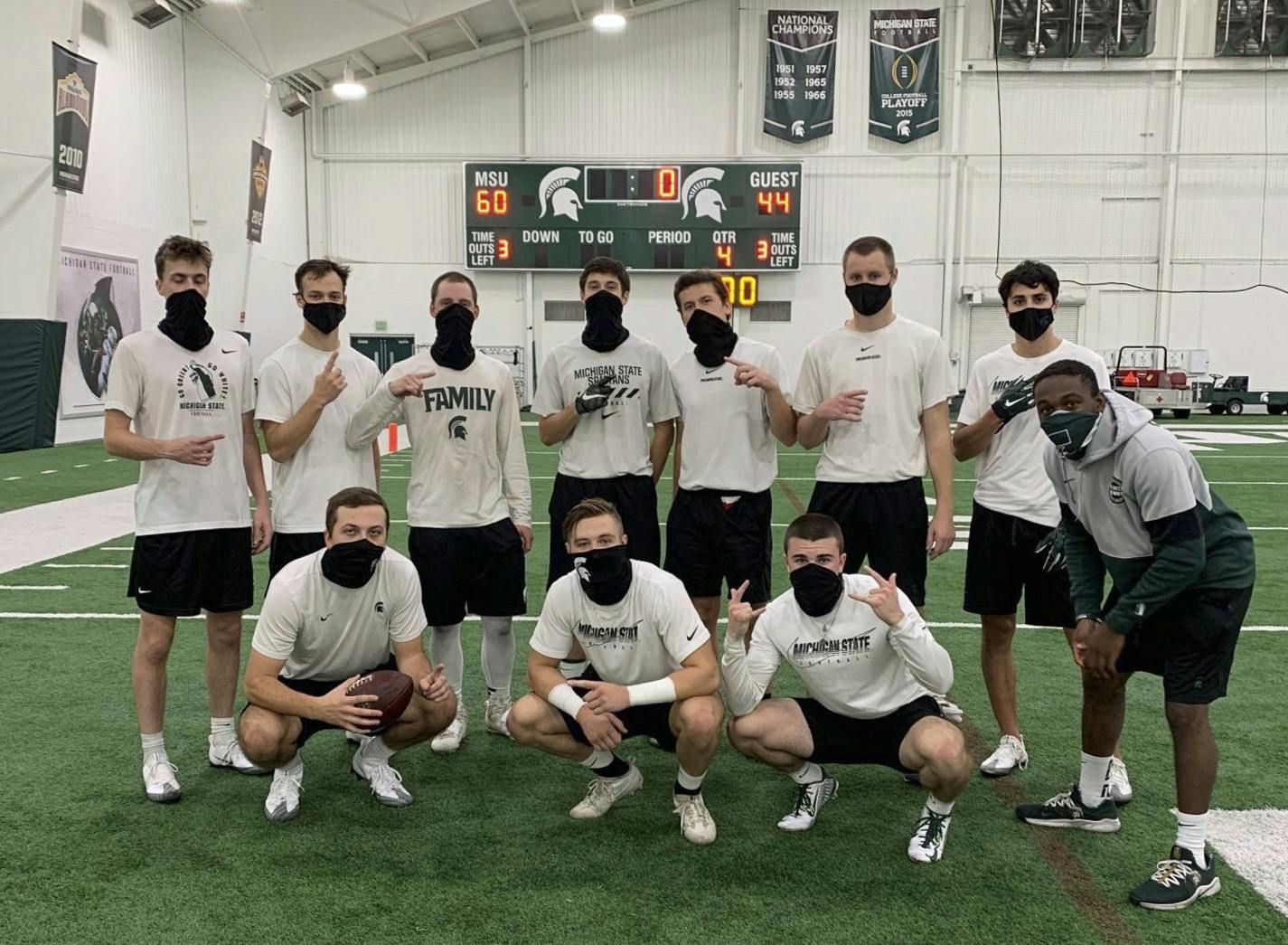
Michigan State's student equipment managers pose at the Skandalaris Football Center on the indoor practice field.
Pictured, back row (from left to right): Andrew Campbell, Michael Grodi, Dan Kalchik, Liam Ryan, Ben Connelly, Ryan Campbell, Nick Franz and Markael Butler. Front row (from left to right): Ryan Daugherty, Mason Ruddy and Casey Edwards. (Photo courtesy: Ryan Daugherty, Michigan State Class of 2022)
Ryan Daugherty stormed out of the tunnel into Spartan Stadium's Kentucky bluegrass field like he had so many times before.
The rumble of footsteps so familiar to him, his blood was pumping. It was game day.
In a year where he thought it might not happen, Daugherty, a student equipment manager with MSU football, was back in the place he had come to love.
Then he looked around, at everything. Except for a smattering of family members sitting in the stands, it was empty.
His beloved palace of college football, the gargantuan house of steel and concrete whose painted sideline is decorated by the equipment he and so many other students work every home game to set up.
Empty.
His heart sunk. His whole life had gotten to see some of the best environments in college football: Kirk Cousins at Penn State when MSU won the Big Ten title, one of the many.
This time, he didn't get to share his passion for the game that was taken away from him as a player and young man when he hurt his back. This time, he was one of a few that got to witness the game face to face that so many laugh, cry and scream over every Saturday in the fall.
This time, he stared at the metal seats and emptiness stared back.
Fake crowd noise replicating 75,000 people that no longer roared like the crashing of ocean waves onto a beach, empty bleachers with cardboard cutouts silently cutting through the wind, no chants to rile up the warriors in the arena.
Empty.
This isn't how things are supposed to be. As the advertising management senior recalled, the last time things were like this was 1918. "Spanish Flu," Daugherty said into the phone, shocked at the revelation that 102 years later life can still bend at the unrelenting will of a pandemic.
Daugherty has been around MSU football since a young age. It wasn't fair.
He knew he was lucky; He had COVID-19, and the season and sport he loved working around were nearly ripped away again. He had been worried for the season until the Big Ten found a way to safely put the puzzle pieces together.
"We're a part of history right now," Daugherty said, thinking about the season. "... I can't wait until I can tell my kids that I went through a football season where we had a pandemic going on, worked a football season with no fans, strict rules, guidelines we had to follow, being tested."
Daugherty and the rest of the student equipment staff found a way to help make an improbable season possible. While it might seem like a minor part of a major college football program, their thankless tasks help everything run smoothly during a football season that hung by a thread.
A spotlight shining on helmets the managers screw together only meters away is one that the 10 students who work in equipment often don't get to have on them.
They just do their job.
Even when short-handed, even when they got COVID-19, even when they prepared for games against Maryland that were erased as soon as they were etched into a schedule with pencil, not pen.
They just do their job.
Support student media! Please consider donating to The State News and help fund the future of journalism.
And some of those 10 shared with The State News what their experience was in possibly the strangest season in modern college football history.
"I wash jockstraps"
"Hey man, want to do laundry?"
More or less, that's how the conversation went between accounting senior Michael Grodi and supply chain management junior Nick Franz, who met and became close friends in Greece while studying abroad.
Neither played much football growing up, Grodi said. He liked hoops more anyway.
Next, they hopped on board with MSU football during one of the largest transitions in program history. Both were on equipment staff for the final act of Mark Dantonio's all-time winning tenure in East Lansing.
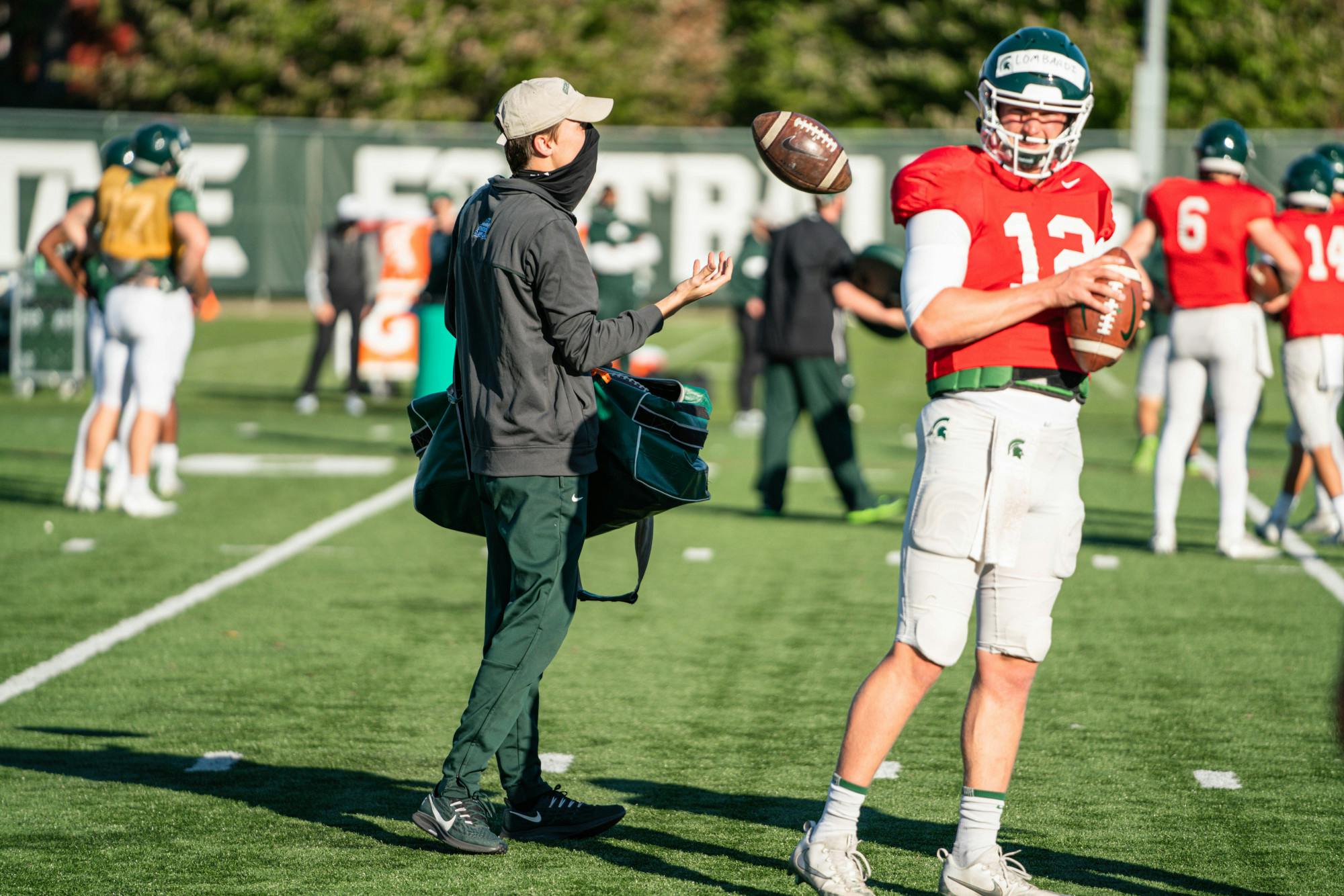
"I wash jockstraps," Grodi said.
It was a rite of passage for the pair before coming on to work practices, help run drills and move sleds, cones and other equipment necessary for running a football practice session.
"My freshman year I went to the Michigan game," Franz said. "It was at home, and I went super early. I got to like the second row and I saw these dudes playing catch on the field before the game and I thought it was pretty cool. I said, ‘Yeah, I’m going to do that.'"
He missed the tryouts, but that wasn't stopping him. Luckily, one spot was open.
That's how Franz got to see Kinnick Stadium at Iowa for the first time in person. Those types of experiences are what fuel the love they all have for the football program they screw helmets, wash uniforms and wake up at 6 a.m. on noon kickoff days — not to drink Miller Lite — to set up benches on a sideline and locker rooms.
On average, Markael Butler, a senior student equipment manager, said the students on staff put in about five hours a day during the week on top of their lives as college students.
"It's definitely not the most glamorous of jobs," Grodi said.
Perseverance in a pandemic
The responsibility that college athletes hold in their hands during their seasons is not something carried alone.
Students, coaches and even day-to-day workers around the programs hold the same responsibility of not letting the bubble burst. In a time where more than 22.6 million people have tested positive for COVID-19 in the United States according to John Hopkins University, there's a shared responsibility.
The roles of the student managers and work didn't change much. However, Butler said the group shrunk from 14 managers to 10, increasing the workloads.
This made things difficult at times as different members of the staff tested positive for COVID-19 though they faced no severe repercussions.
"Our biggest responsibility (most of the time) was, ‘Hey, don’t get sick,'" Casey Edwards, an MSU junior and student equipment manager, said. "... Most of my week, the only time I got outside was to go to practice and any other time I was inside my apartment hanging out. If I saw people during the week it was the equipment or football guys, it was nobody on the outside."
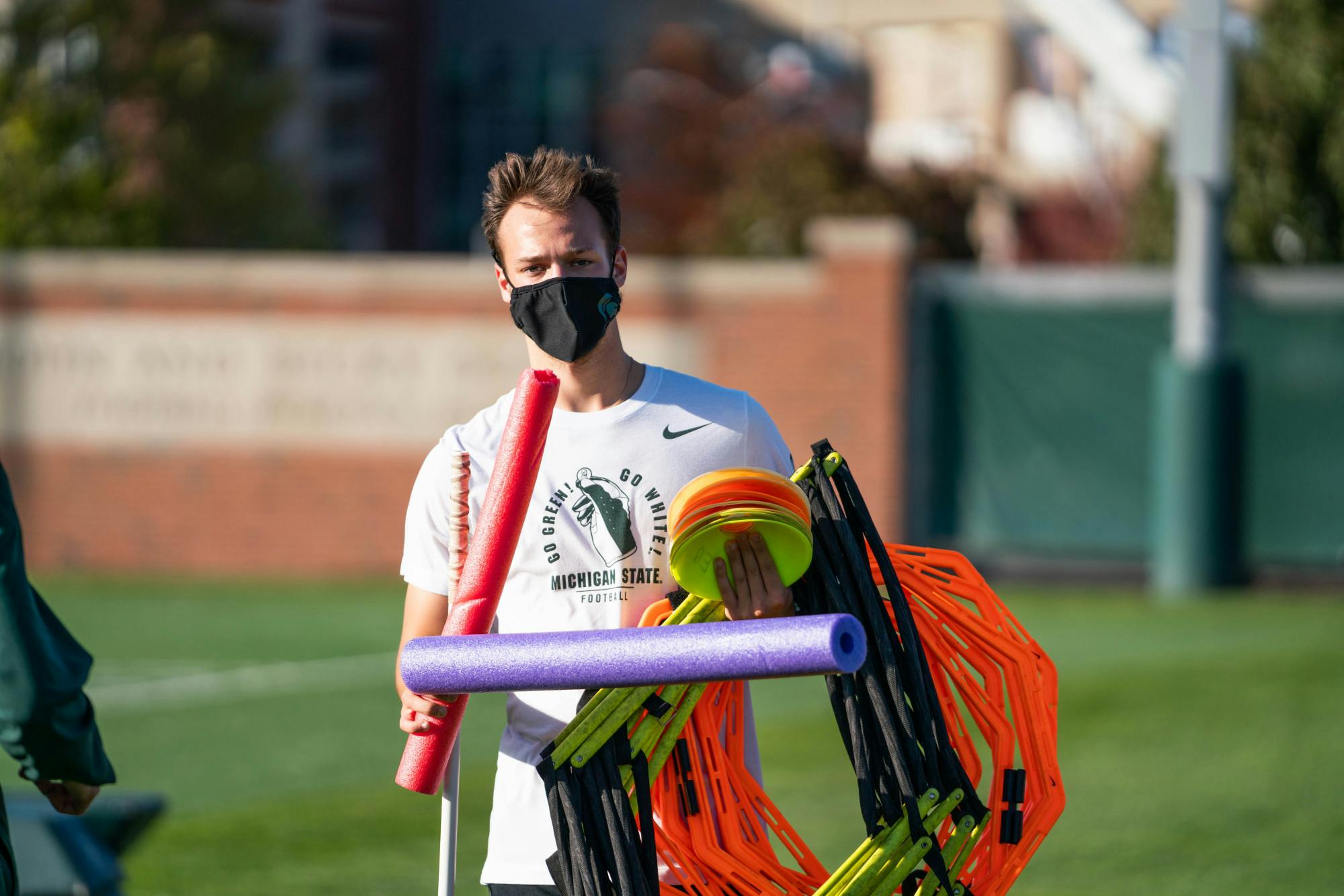
According to MSU’s 2019 Equity in Sports report, football and men’s basketball brought in nearly $100 million in revenue. The next biggest revenue stream comes from ice hockey at $2.7 million. That number is lower now with no fans allowed in any arena on campus at MSU, but it represents the financial gravity of major Division I athletics.
“It was definitely kind of hard but at the end of the day ... you think, ‘I’m a part of something; I’m dedicating this much time to it; I want to make sure I can do my job as best as possible'," Franz said. "... How many times nowadays do people get to interact with 200+ people in a close environment every day? So, it was kind of like, I don’t want to say a fantasy land for us, but that really just goes down to Markael's (Butler's) leadership and Andrew Kolpacki and Dan Kalchik, who are our bosses (to make it possible)."
Franz said perseverance was an ideology he pulls from what he called a lifelong experience.
It's what held the group together as friends burned couches in streets after MSU overcame being a double-digit underdog in Ann Arbor. When they all had to stay home for Thanksgiving, the 10 played the video and recruitment staff in a game of flag football, dubbed: The Turkey Bowl. Which, of course, they will make sure you know, the equipment managers won, 60-44.
It was their reprieve from a day spent normally with family.
They joined together after major wins over AP-ranked Northwestern and Michigan. When they couldn't leave a hotel anymore to keep everything they worked to help make happen together, they gathered and watched "The Mandalorian" together.
"I consider (them) my brothers," Edwards said. "It’s a close-knit group."
"We got to turn around. ... The season is over"
Edwards thought it couldn't be. As he sat at a road stop outside of Cleveland, Ohio, snacking and waiting for the confirmation, he already knew what was going to happen that Friday.
Michigan State football's season was going to be over.
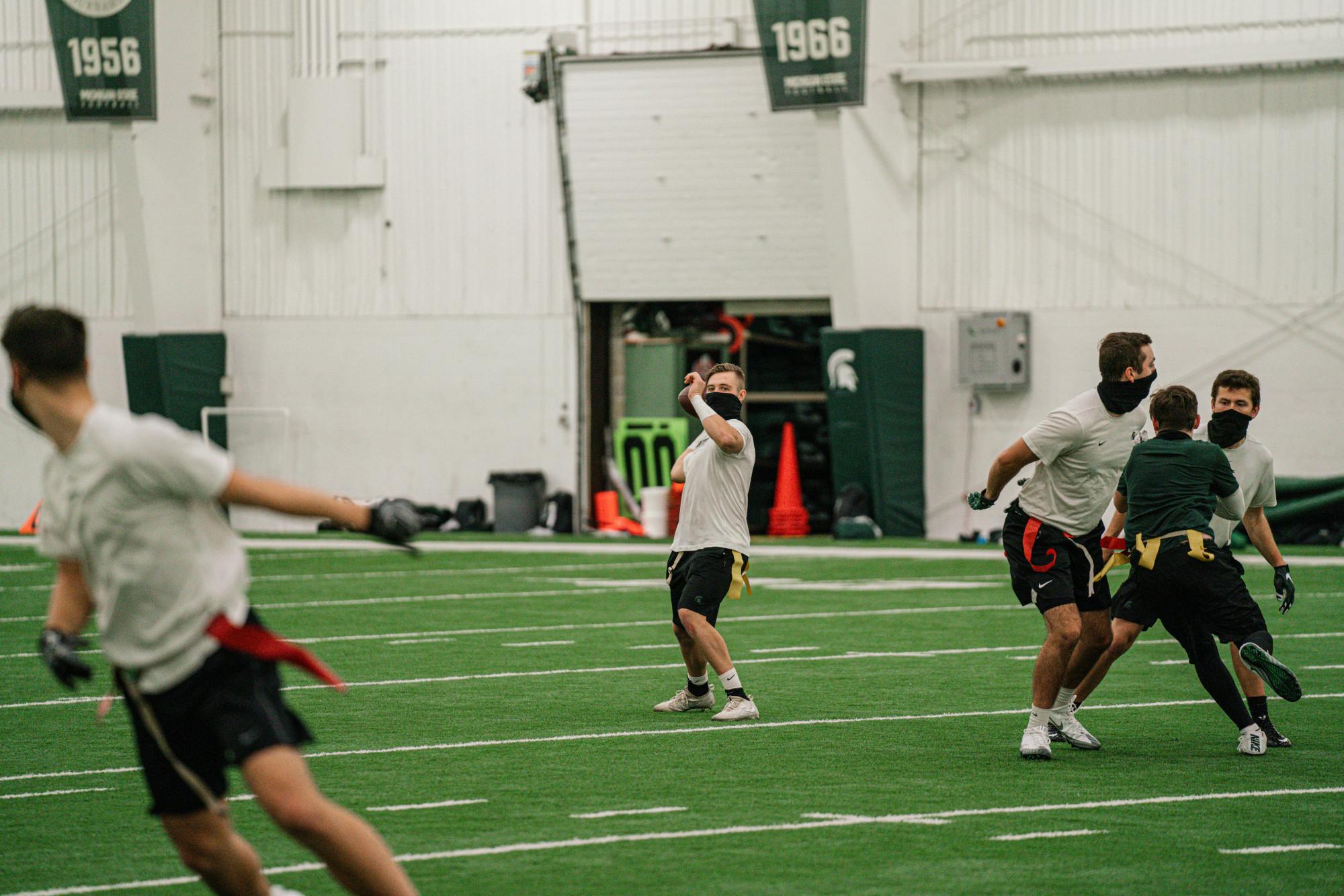
The Spartans (2-5) inevitably did not accept a postseason bowl game bid.
He was a part of the first leg of a caravan that was the team equipment and media staff on its way to Maryland for the Spartans' matchup set to take place during the weekend of the Big Ten Championship as a part of Big Ten Champions Week.
"We are halfway to Cleveland and we are thinking, 'Well, there might not even be a game, so why are we still driving?' you know?" Edwards said, almost questioning the unrealistic nature of the moment. "In all honesty, we were like the first people to know."
"It was surreal"
Butler always gets to the facility early. There is always something to get done whether its striping the Gruff Sparty across the sides of helmets or chatting with other managers before their workday begins, he said.
This time Butler's Spartan-logo mask absorbs the light shining off the steel doors of the MSU's practice facility. It's hot, with temperatures in the high 70s. It's a late summer day.
The thing he thought wouldn't happen was back. The senior's path all began when he went to an MSU athletics career fair on campus as a freshman.
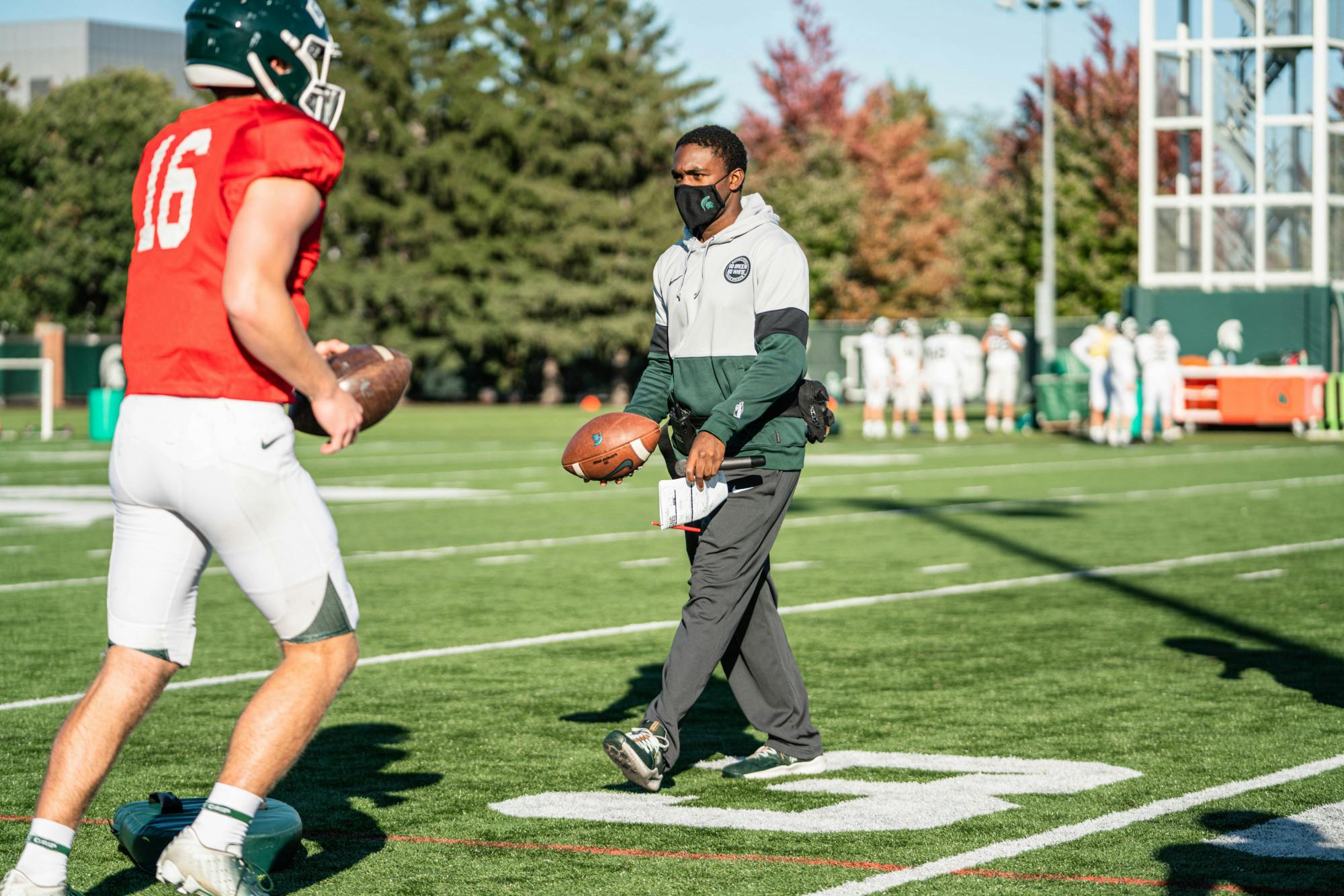
Markael Butler hands a football off to a player during an early-season practice. Butler graduated during the fall semester and plans to pursue a law degree. (Courtesy: MSU Football Creative Department)
"Basically from there, went and tried out," he said. "The rest was history after that."
He is soft-spoken, a student lead on the equipment staff. Not even he thought he'd see empty stadiums on a game day.
"You know running out of the tunnel, to no fans or having big plays you don’t really have a crowd going," Butler said. "Getting that energy in sports that's a helpful advantage (and) you can really feel it there, especially Big Ten stadiums."
Butler has seen nearly every stadium in the Big Ten. The graduating senior understands how important home-field advantage is in college football.
He was even at the famous "trouble with the snap" game against Michigan.
He compared that game to the Spartans' 27-24 win in Ann Arbor this season.
"From our view on the sideline, man, they just, at that moment, you didn’t feel like there were no fans there," Butler said, laughing. "You just have your own little party. We're in our own little world. It was just one of those games. … We wish there would’ve been fans there. It would’ve made it 10 times better just to rub it in their faces."
"It was surreal," Grodi said. "It's a once in a lifetime opportunity. Hopefully, something that'll never happen again. ... I felt lucky and unlucky to be a part of it. ... It's something you couldn't even imagine."
Butler didn't expect his time as a staple of the MSU football sidelines to come to have its curtain call this way. He's at peace with the final stanza of the poem that has been his time with the program closing the door behind him as he walks in cap and gown.
It's poetic almost, that Butler's final season with the program came in Tucker's first.
"It’s been awesome honestly, being up close and personal," Butler said. "Being able to go to practice every day. Really watch football every day, especially if you love it. ... Over the years for me, personally, one of the best things I’ve ever done. I don’t think I’d ever do anything differently with that. I enjoyed every moment of it."
This article is part of our MLK Day print issue. Read the full issue here.